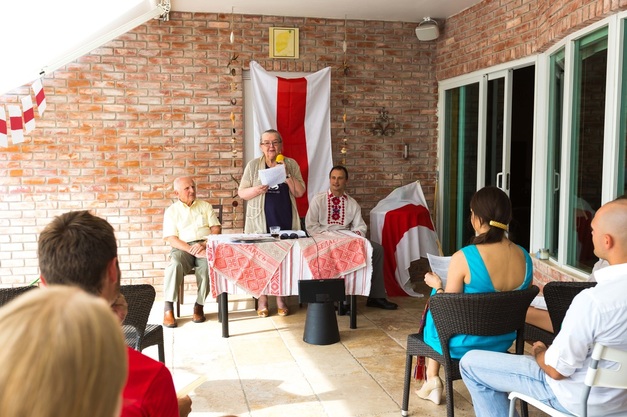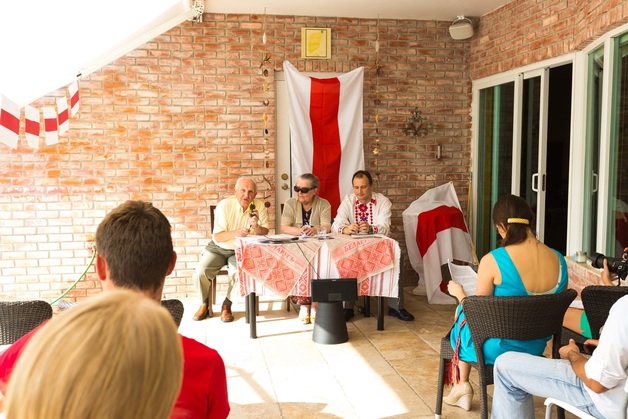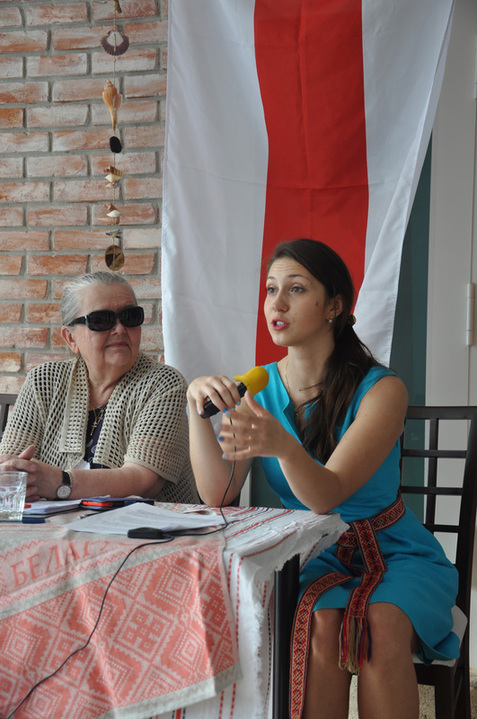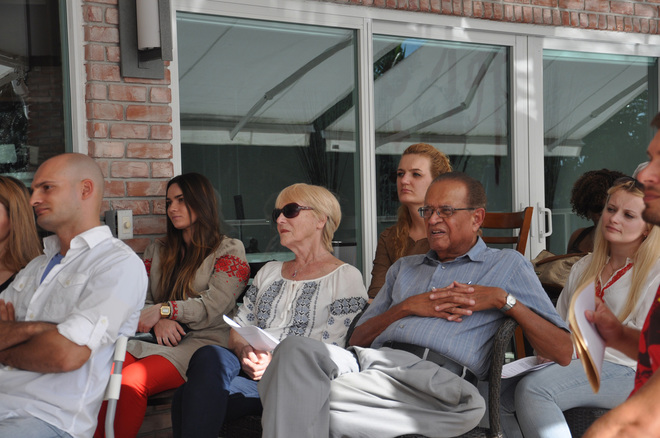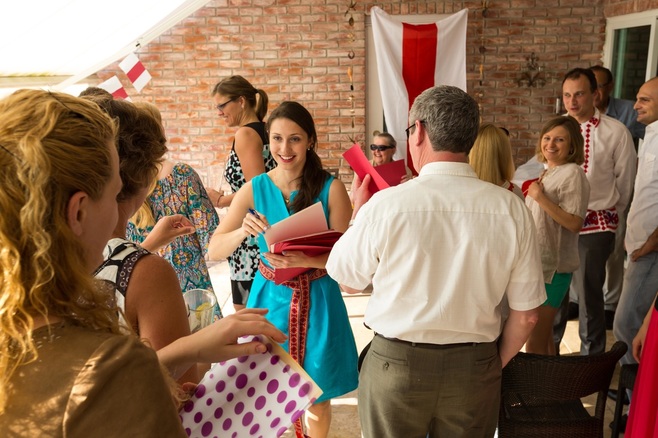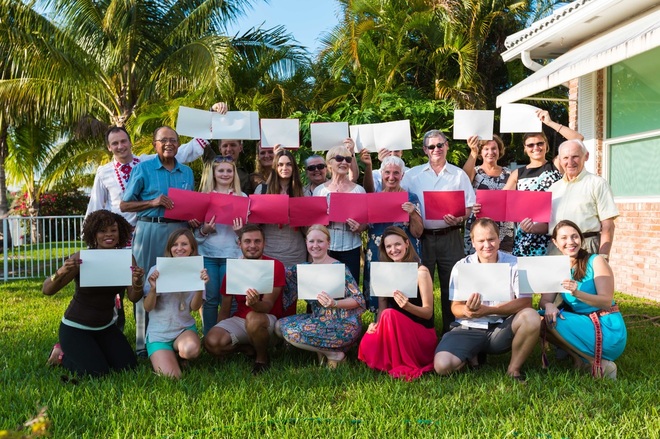Freedom Day 2015
On March 25, 2015, South Florida Chapter of the Belarusian-American Association BAZA celebrated the Freedom Day.
I am pleased to note that the anniversary of the proclamation of the Belarusian Democratic Republic [A.K.A the Belarusian People's Republic] gathered both the Belarusians from South Florida and the visiting guests.
The event was honored by the presence of the following prominent Belarusians living abroad: Ivonka Survilla, President of the Rada [a.k.a. Council] of the Belarusian Democratic Republic; Viachka Stankevich, External Organizational Director of the Belarusian-American Association (BAZA); Ala Orsa-Romano, President of Orsa-Romano Cultural and Educational Foundation (ORCEF), Secretary of Education at Rada of the Belarusian Democratic Republic.
Ivonka Survilla told the audience about the history of the Belarusian Democratic Republic (BNR), as well as about its historical significance for the Belarusians. The Belarusian Democratic Republic was proclaimed as an independent state in 1918, but, unfortunately, it could not resist the aggression of the Bolsheviks, who with the help of the Red Army created the Belarusian Soviet Socialist Republic. In her opinion, the proclamation of the Belarusian Democratic Republic was one of the most significant events in modern history of Belarus due to the fact that the Belarusian Democratic Republic, not Belarusian Soviet Socialist Republic, laid the foundation of the Belarusian statehood.
According to her, the patriotism and solidarity of the Belarusians are essential in order for Belarus to remain independent and carry out democratic reforms in the country.
Viachka Stankevich spoke about the history of the Belarusian-American Association (BAZA), which was founded by the post-war immigrants from Belarus in 1949. According to the speaker, the organization was created to represent the interests of Belarusians in the United States.
Viachka Stankevich also stated present goals and objectives of the Belarusian-American Association BAZA. According to him, the highest priorities are: protection of traditional Belarusian values, preservation and development of Belarusian history and culture, promotion of democratic changes and protection of human rights and freedoms in Belarus.
I, being Chairman of the South Florida Chapter of the Belarusian-American Association BAZA, expressed my opinion about the reasons why the Belarusian authorities deny the Freedom Day, underestimate the historical significance of the Belarusian Democratic Republic and ban the celebration of the Freedom Day in Belarus. I think that the creation and proclamation of the Belarusian Democratic Republic in 1918 were the results of the will of the Belarusians. In modern Belarus, the Belarusian Democratic Republic has become a symbol of freedom, independence and people’s free will. The Belarusian Soviet Socialist Republic, which was violently established by the Bolsheviks after the crackdown of the Belarusian Democratic Republic, has nothing to do with the free will of the Belarusians. The Belarusian Soviet Socialist Republic represents the form of a dictatorial regime, which the Belarusian authorities have been trying to create in Belarus today. Determination to remain in power at all costs and suppression of criticism of government agencies, exhibited by both modern Belarus and the Belarusian Soviet Socialist Republic, radically contradict the fundamental ideas behind the proclamation of the Belarusian Democratic Republic.
I believe that the proclamation of the Belarusian Democratic Republic was the inevitable result of the struggle for freedom waged by the Belarusians. To my mind, in spite of all its shortcomings, the Belarusian Democratic Republic was our first true national state. The cultural and historical significance of the Belarusian Democratic Republic for the Belarusian people goes far beyond the time of its existence on the territory of Belarus.
In conclusion, Palina Prysmakova, Secretary of BAZA in South Florida, told about her impression on present state of affairs in state public service organizations and non-profit ones in modern Belarus. Her research has shown that honest human beings, who love Belarus and its people, work at both non-profit and state public service organizations. Palina summed up that it is possible to build free democratic Belarus as long as such wonderful people live there.
In the end, the participants created a “live” flag of the Belarusian Democratic Republic from the red and white sheets of paper.
I am pleased to note that the anniversary of the proclamation of the Belarusian Democratic Republic [A.K.A the Belarusian People's Republic] gathered both the Belarusians from South Florida and the visiting guests.
The event was honored by the presence of the following prominent Belarusians living abroad: Ivonka Survilla, President of the Rada [a.k.a. Council] of the Belarusian Democratic Republic; Viachka Stankevich, External Organizational Director of the Belarusian-American Association (BAZA); Ala Orsa-Romano, President of Orsa-Romano Cultural and Educational Foundation (ORCEF), Secretary of Education at Rada of the Belarusian Democratic Republic.
Ivonka Survilla told the audience about the history of the Belarusian Democratic Republic (BNR), as well as about its historical significance for the Belarusians. The Belarusian Democratic Republic was proclaimed as an independent state in 1918, but, unfortunately, it could not resist the aggression of the Bolsheviks, who with the help of the Red Army created the Belarusian Soviet Socialist Republic. In her opinion, the proclamation of the Belarusian Democratic Republic was one of the most significant events in modern history of Belarus due to the fact that the Belarusian Democratic Republic, not Belarusian Soviet Socialist Republic, laid the foundation of the Belarusian statehood.
According to her, the patriotism and solidarity of the Belarusians are essential in order for Belarus to remain independent and carry out democratic reforms in the country.
Viachka Stankevich spoke about the history of the Belarusian-American Association (BAZA), which was founded by the post-war immigrants from Belarus in 1949. According to the speaker, the organization was created to represent the interests of Belarusians in the United States.
Viachka Stankevich also stated present goals and objectives of the Belarusian-American Association BAZA. According to him, the highest priorities are: protection of traditional Belarusian values, preservation and development of Belarusian history and culture, promotion of democratic changes and protection of human rights and freedoms in Belarus.
I, being Chairman of the South Florida Chapter of the Belarusian-American Association BAZA, expressed my opinion about the reasons why the Belarusian authorities deny the Freedom Day, underestimate the historical significance of the Belarusian Democratic Republic and ban the celebration of the Freedom Day in Belarus. I think that the creation and proclamation of the Belarusian Democratic Republic in 1918 were the results of the will of the Belarusians. In modern Belarus, the Belarusian Democratic Republic has become a symbol of freedom, independence and people’s free will. The Belarusian Soviet Socialist Republic, which was violently established by the Bolsheviks after the crackdown of the Belarusian Democratic Republic, has nothing to do with the free will of the Belarusians. The Belarusian Soviet Socialist Republic represents the form of a dictatorial regime, which the Belarusian authorities have been trying to create in Belarus today. Determination to remain in power at all costs and suppression of criticism of government agencies, exhibited by both modern Belarus and the Belarusian Soviet Socialist Republic, radically contradict the fundamental ideas behind the proclamation of the Belarusian Democratic Republic.
I believe that the proclamation of the Belarusian Democratic Republic was the inevitable result of the struggle for freedom waged by the Belarusians. To my mind, in spite of all its shortcomings, the Belarusian Democratic Republic was our first true national state. The cultural and historical significance of the Belarusian Democratic Republic for the Belarusian people goes far beyond the time of its existence on the territory of Belarus.
In conclusion, Palina Prysmakova, Secretary of BAZA in South Florida, told about her impression on present state of affairs in state public service organizations and non-profit ones in modern Belarus. Her research has shown that honest human beings, who love Belarus and its people, work at both non-profit and state public service organizations. Palina summed up that it is possible to build free democratic Belarus as long as such wonderful people live there.
In the end, the participants created a “live” flag of the Belarusian Democratic Republic from the red and white sheets of paper.
День Волі 2015
25 сакавіка 2015 года гурток Беларуска-Амерыканскага Задзіночаньня БАЗА Ў Паўдневай Фларыдзе адсвяткаваў Дзень Волі
Прыемна адзначыць, што ўгодкі заснавання Беларускай Народнай Рэспублікі сабралі як беларусаў, пражываючых у Паўднёвай Фларыдзе, так прыезджых гасцей.
Мерапрыемства ўшанавалі сваёй прысутнасцю такія выбітныя беларусы замежжа як Івонка Сурвілла, Cтаршыня Рады Беларускай Народнай Рэспублікі, Вячка Станкевіч, Арганізацыйны Вонкавы Дырэктар Беларуска-Амэрыканскага Задзіночаньня (БАЗА), а таксама Ала Орса-Рамано, Прэзідэнт Культурна-Адукацыйнага Фонду Орса-Рамано, Сакратар Адукацыі пры Радзе Беларускай Народнай Рэспублікі.
Івонка Сурвілла распавяла прысутным пра гісторыю ўзнікнення Беларускай Народнай Рэспублікі (БНР), а таксама яе гістарычную значнасці для беларускага народа. Беларуская Народная Рэспубліка была абвешчаная незалежнай дзяржавай у 1918 годзе, аднак на жаль, яна не змагла супрацьстаяць агрэсіі бальшавікоў, якія пры дапамозе Чырвонай Арміі стварылі БССР. На яе думку, абвяшчэнне БНР - адна з самых значных падзей для сучаснай гісторыі Беларусі, бо БНР, а не БССР, залажыла аснову беларускай дзяржаўнасці.
Любоў да сваёй краіны і салідарнасць беларусаў, па яе словах, з'яўляюцца неабходнымі ўмовамі для захавання незалежнасці Беларусі і правядзення дэмакратычных рэформаў у краіне.
Вячка Станкевіч распавёў, пра гісторыю ўзнікнення Беларуска-Амерыканскага Задзіночаньня БАЗА, якое была заснавана ў 1949 годзе пасляваеннай эміграцыяй беларусаў. Па словах выступоўцы, арганізацыя была створана для прадстаўлення інтарэсаў беларусаў у ЗША.
Спадар Вячка Станкевіч таксама асвяціў мэты і задачы Беларуска-Амерыканскага Задзіночаньня БАЗА на сучасным этапе. На думку выступоўцы, аднымі з найбольш прыярытэтных з'яўляеюцца ахова традыцыйных каштоўнасцяў Беларусі, захаванне і развіцце беларускай культуры і гісторыі, спрыянне дэмакратычным зменам і ахова правоў і свабод чалавека ў Рэспубліцы Беларусь.
Я, з'яўляючыся Старшыней гуртка Беларуска-Амерыканскага Задзіночаньня БАЗА ў Паўдневай Фларыдзе, выказаў свае думкі на кошт таго, чаму беларускія ўлады адмаўляюць Дзень Волі, прыніжаюць гістарычную значнасць БНР і забараняюць святкаванне Дня Волі ў Беларусі. На маю думку, стварэнне і абвяшчэнне Беларускай Народнай Рэспублікі ў 1918 годзе з'явілася вынікам волевыяўлення беларусаў. У сучаснай Беларусі БНР стала сімвалам свабоды, незалежнасці і вольнага волевыяўлення народа. БССР, якая была гвалтоўна створана бальшавікамі пасля разгону БНР, не мае нічога агульнага з воляй беларусаў. БССР ўяўляе сабой мадэль дыктатарскага рэжыму ў краіне, якую імкнуцца стварыць беларускі ўлады ў сучаснай Беларусі. Імкненне ўтрымаць уладу любой цаной і спыненне любой крытыкі дзейнасці дзяржаўных органаў, уласцівыя сучаснай Беларусі і БССР, у корані супярэчаць ідэям, закладзеным пры стварэнні БНР.
Я веру, што абвяшчэнне БНР было натуральным вынікам імкнення беларускага народа да свабоды. На маю думку, БНР, з усімі яе недахопамі, была нашай першай праўдзівай нацыянальнай дзяржавай. Культурнае і гістарычнае значэнне БНР для беларускага народа выходзіць далёка за рамкі часу яго фактычнага існавання на тэрыторыі Беларусі.
У заключэнні, сакратар БАЗА ў Паўднёвай Фларыдзе, Паліна Прысмакова, распавяла пра свае асабістыя ўражанні, што да стану дзяржаўных і пазаўрадавых арганізацыяў у сучаснай Беларусі, якія аказваюць грамадскія паслугі насельніцтву. Яе даследванне паказала што, як ў пазаўрадавых, так і ў дзяржаўных арагнізацыях, працуюць шчырыя людзі, адданыя Беларусі і яе жыхарам. Паліна падсумавала, что свабодная дэмакратычная Беларусь мае надзею на існаванне, пакуль у ёй жывуць такія цудоўныя людзі.
У самым канцы, ўдзельнікі мерапрыемства з белых і чырвоных лістоў паперы стварылі «жывы» сцяг Беларускай Народнай Рэспублікі.
Прыемна адзначыць, што ўгодкі заснавання Беларускай Народнай Рэспублікі сабралі як беларусаў, пражываючых у Паўднёвай Фларыдзе, так прыезджых гасцей.
Мерапрыемства ўшанавалі сваёй прысутнасцю такія выбітныя беларусы замежжа як Івонка Сурвілла, Cтаршыня Рады Беларускай Народнай Рэспублікі, Вячка Станкевіч, Арганізацыйны Вонкавы Дырэктар Беларуска-Амэрыканскага Задзіночаньня (БАЗА), а таксама Ала Орса-Рамано, Прэзідэнт Культурна-Адукацыйнага Фонду Орса-Рамано, Сакратар Адукацыі пры Радзе Беларускай Народнай Рэспублікі.
Івонка Сурвілла распавяла прысутным пра гісторыю ўзнікнення Беларускай Народнай Рэспублікі (БНР), а таксама яе гістарычную значнасці для беларускага народа. Беларуская Народная Рэспубліка была абвешчаная незалежнай дзяржавай у 1918 годзе, аднак на жаль, яна не змагла супрацьстаяць агрэсіі бальшавікоў, якія пры дапамозе Чырвонай Арміі стварылі БССР. На яе думку, абвяшчэнне БНР - адна з самых значных падзей для сучаснай гісторыі Беларусі, бо БНР, а не БССР, залажыла аснову беларускай дзяржаўнасці.
Любоў да сваёй краіны і салідарнасць беларусаў, па яе словах, з'яўляюцца неабходнымі ўмовамі для захавання незалежнасці Беларусі і правядзення дэмакратычных рэформаў у краіне.
Вячка Станкевіч распавёў, пра гісторыю ўзнікнення Беларуска-Амерыканскага Задзіночаньня БАЗА, якое была заснавана ў 1949 годзе пасляваеннай эміграцыяй беларусаў. Па словах выступоўцы, арганізацыя была створана для прадстаўлення інтарэсаў беларусаў у ЗША.
Спадар Вячка Станкевіч таксама асвяціў мэты і задачы Беларуска-Амерыканскага Задзіночаньня БАЗА на сучасным этапе. На думку выступоўцы, аднымі з найбольш прыярытэтных з'яўляеюцца ахова традыцыйных каштоўнасцяў Беларусі, захаванне і развіцце беларускай культуры і гісторыі, спрыянне дэмакратычным зменам і ахова правоў і свабод чалавека ў Рэспубліцы Беларусь.
Я, з'яўляючыся Старшыней гуртка Беларуска-Амерыканскага Задзіночаньня БАЗА ў Паўдневай Фларыдзе, выказаў свае думкі на кошт таго, чаму беларускія ўлады адмаўляюць Дзень Волі, прыніжаюць гістарычную значнасць БНР і забараняюць святкаванне Дня Волі ў Беларусі. На маю думку, стварэнне і абвяшчэнне Беларускай Народнай Рэспублікі ў 1918 годзе з'явілася вынікам волевыяўлення беларусаў. У сучаснай Беларусі БНР стала сімвалам свабоды, незалежнасці і вольнага волевыяўлення народа. БССР, якая была гвалтоўна створана бальшавікамі пасля разгону БНР, не мае нічога агульнага з воляй беларусаў. БССР ўяўляе сабой мадэль дыктатарскага рэжыму ў краіне, якую імкнуцца стварыць беларускі ўлады ў сучаснай Беларусі. Імкненне ўтрымаць уладу любой цаной і спыненне любой крытыкі дзейнасці дзяржаўных органаў, уласцівыя сучаснай Беларусі і БССР, у корані супярэчаць ідэям, закладзеным пры стварэнні БНР.
Я веру, што абвяшчэнне БНР было натуральным вынікам імкнення беларускага народа да свабоды. На маю думку, БНР, з усімі яе недахопамі, была нашай першай праўдзівай нацыянальнай дзяржавай. Культурнае і гістарычнае значэнне БНР для беларускага народа выходзіць далёка за рамкі часу яго фактычнага існавання на тэрыторыі Беларусі.
У заключэнні, сакратар БАЗА ў Паўднёвай Фларыдзе, Паліна Прысмакова, распавяла пра свае асабістыя ўражанні, што да стану дзяржаўных і пазаўрадавых арганізацыяў у сучаснай Беларусі, якія аказваюць грамадскія паслугі насельніцтву. Яе даследванне паказала што, як ў пазаўрадавых, так і ў дзяржаўных арагнізацыях, працуюць шчырыя людзі, адданыя Беларусі і яе жыхарам. Паліна падсумавала, что свабодная дэмакратычная Беларусь мае надзею на існаванне, пакуль у ёй жывуць такія цудоўныя людзі.
У самым канцы, ўдзельнікі мерапрыемства з белых і чырвоных лістоў паперы стварылі «жывы» сцяг Беларускай Народнай Рэспублікі.
